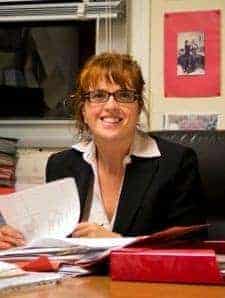U.O.C. di Genetica Medica
Università di Siena – Dipartimento di Biotecnologie Mediche
Azienda Ospedaliera Universitaria Senese – Ospedale Santa Maria alle Scotte
Viale Mario Bracci
53100 SIENA
ITALY
Lead

Pr Dr Alessandra Renieri
Phone: +39 0577 585316
Fax: +39 0577 233325
Scope
The area of expertise of the Siena Centre of the ITHACA European Reference Network (ERN) covers all syndromes exhibiting developmental anomalies and/or intellectual disability (ID). Since its establishment, the Siena Center has been strongly active in the diagnosis of diseases with intellectual disability and prone to the development of national and international networks, as represented by “The X-linked Mental Retardation Italian Network”. This network has been active since 2003, collecting detailed clinical information and biological samples from a large number of ID patients inserted in a web-based database presently available at the address http://www.biobank.unisi.it/. The bank is partially supported by the Telethon Italian Foundation, founding partner of the “Telethon Network of Genetic Biobanks (TNGB)” and partner of the “BBMRI – Biobanking and BioMolecular resources Research Infrastructure of Italy.
The expertise of Siena ITHACA Centre includes:
- Multiple congenital anomalies (MCA);
- Dysmorphic syndromes with or without intellectual disability;
- Autistic spectrum disorders.
All these conditions could be monogenic, polygenic or detectable through array technologies.
Service to patients
The Service operates to provide clinical and genetic diagnosis to subjects with genetic diseases and to define the reproductive risk of couples from families with genetically determined conditions. The Centre contributes to the care of patients by offering genetic counseling and genetic diagnosis, newborn and pediatric evaluation, neuropsychological and neuropsychiatric evaluation, prenatal diagnosis, follow-up and therapeutic care. Within the genetic counseling, different assessments can be provided, including pre- and post-testing, monitoring, follow-up visits and the release of disease certification for the National Health System.
The Department of Medical Genetics includes the laboratory unit that was among the first in Italy to introduce the technology of Next Generation Sequencing (NGS) for clinical diagnosis and research. In particular, NGS is a high-throughput methodology. It allows massive parallel sequencing consisting of simultaneous sequencing of multiple targeted genomic regions in multiple samples in order to detect concomitant mutations in the same run. It has enable more sequences to be generated at a lower cost; it reduces turnaround time of analysis which leads to reduced clinical reporting time; the analysis requires very low input of DNA/RNA. A variety of genomic aberrations with high accuracy and sensitivity can be screened simultaneously, such as single/multiple-nucleotide variants, small and large insertions and deletions, copy-number variations (CNVs), and fusion transcripts. The platform offers services of RNAseq, miRNoma, methyloma, exome and human genome on blood, tissues or biological fluids (liquid biopsy). The service has recently implemented the already extensive sequencing platform with the platform NovaSeq 6000 System. The service includes bioinformatic analysis of sequencing data, reanalysis and reinterpretation.
Recently, the Siena Centre offers the possibility to perform Medically Assisted Reproductive Technologies with Preimplantation Genetic Testing. Multidisciplinary visits and multiprofessional case discussions are regularly performed for an optimal management of the patient. The Centre has a tight connection with patients associations organizing meetings with patients and experts, The Siena Center interest also lies on the patient side, promoting the innovative patient/clinical/academic science international collaboration in order to creating a brighter future for those living with a rare disease. It promotes the connection with the families, organizing patient meetings and making sure everyone has the information and support that it can offer; in particular the Centre is in tight contact with parents association as AIRETT Onlus, the Association for early onset seizure variants of Rett syndrome due to CDKL5, parents association for congenital Rett syndrome due to FOXG1 gene, European Federation of Rett associations (RSE), parents association for IQSEC2-syndrome and others.
Organization of the ITHACA ERN – Siena Centre
The Azienda Ospedaliera Universitaria Senese (AOUS), the Heath Care provider (HCP) for the Siena Centre, is structured in 10 departments directed by General Manager, Chief Financial Officer, Chief Medical Officer, and Chief Nursing Officer. Each department is divided in several units:
- the Medical Genetics Unitis a part of Innovation, Experimentation, Clinical and Translational Research department;
- the Radiology Unitis part of Radiological Science department;
- the Child Neuropsychiatry Unitis part of Mental and Sensorineural Health Department;
- the Pediatric Unitis part of the Maternal and Child Department;
- the Neurology and Neurometabolic diseases Unitis part of Neurological and Physical Sciences department.
Medical Genetics Unit (Prof. Alessandra Renieri) offers genetic consultation for children, adults and pregnant women and assesses molecular genetic tests;
Child Neuropsychiatry Unit has over 30 years of experience in clinical diagnosis, care and management of Rett syndrome and ASD;
Pediatric Unit has a long-lasting experience in diagnosis, treatment and periodic evaluations of patients with rare conditions associated with epilepsy;
Neurology and Neurometabolic diseases Unit takes care of adult patients with rare intellectual disability syndromes and rare malformation syndromes;
Radiology Unit provides a high standard imaging service of technical excellence, such as MRI, for the diagnosis optimization of pediatric and adult patients.
Several healthcare professionals as Neurophysiopatologist, Cardiologists, Odontologists, Gastroenterologists, Physical Therapists and others are integrated into the care pathway in order to offer a complete examination, to improve health conditions and to obtain a defined diagnosis.
